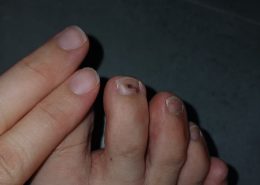Hi, I’m a 21-year-old uni student. Wanna ask, does it really matter what time I sleep, as long as I get enough hours? I usually sleep around 3am after studying and wake up late. My parents keep saying it’s not ...
Hello! From the photo and your history, it does look like a subungual haematoma, which is basically dried blood trapped under the toenail, usually caused by trauma. In your case, it's most likely due to pressure from your tight heels. If it’s been there for months and not getting worse, the blood maRead more
Hello! From the photo and your history, it does look like a subungual haematoma, which is basically dried blood trapped under the toenail, usually caused by trauma. In your case, it’s most likely due to pressure from your tight heels.
If it’s been there for months and not getting worse, the blood may just grow out with the nail over time, nothing to worry about.
But do take note if there’s persistent pain, spreading of discolouration, nail changes like thickening or lifting. If any of these happen, it’s best to get it checked in case of something more serious.
I usually tell my patients to monitor it over a few months unless it’s painful or worsening. You could also see a GP if unsure to get it examined.
Regards,
Dr Say Wei Xian
General Practitioner
IG: Dr Say Wei Xian (General Practitioner)
The information provided on this forum is for educational purposes only and not intended as medical advice. Please consult a healthcare provider for any medical concerns, diagnosis or treatment.
See less


This one is a bit tricky! Technically, if you go to bed and wake up at exactly the same time every single day, your body can get used to it. Most people have days where they sleep earlier or later and that is when the body clock starts getting messed up. Our bodies work best when we sleep during darRead more
This one is a bit tricky!
Technically, if you go to bed and wake up at exactly the same time every single day, your body can get used to it. Most people have days where they sleep earlier or later and that is when the body clock starts getting messed up.
Our bodies work best when we sleep during darkness and wake up to daylight. Remember this, sunlight is not just for waking up, it helps regulate your hormones, metabolism, mood, and even vitamin D levels. Missing out on natural light can affect both your physical and mental health over time.
Long story short, even if you feel fine now, a 3 am sleep schedule is not something I would recommend in the long run.
Regards,
Dr. Syed Anwar (M.D)
Lifestyle Wellness & Mental Health Therapist Trn. (MSc/LKM)
IG: @drsydsage
The information provided on this forum is for educational purposes only and not intended as medical advice. Please consult a healthcare provider for any medical concerns, diagnosis or treatment.
See less